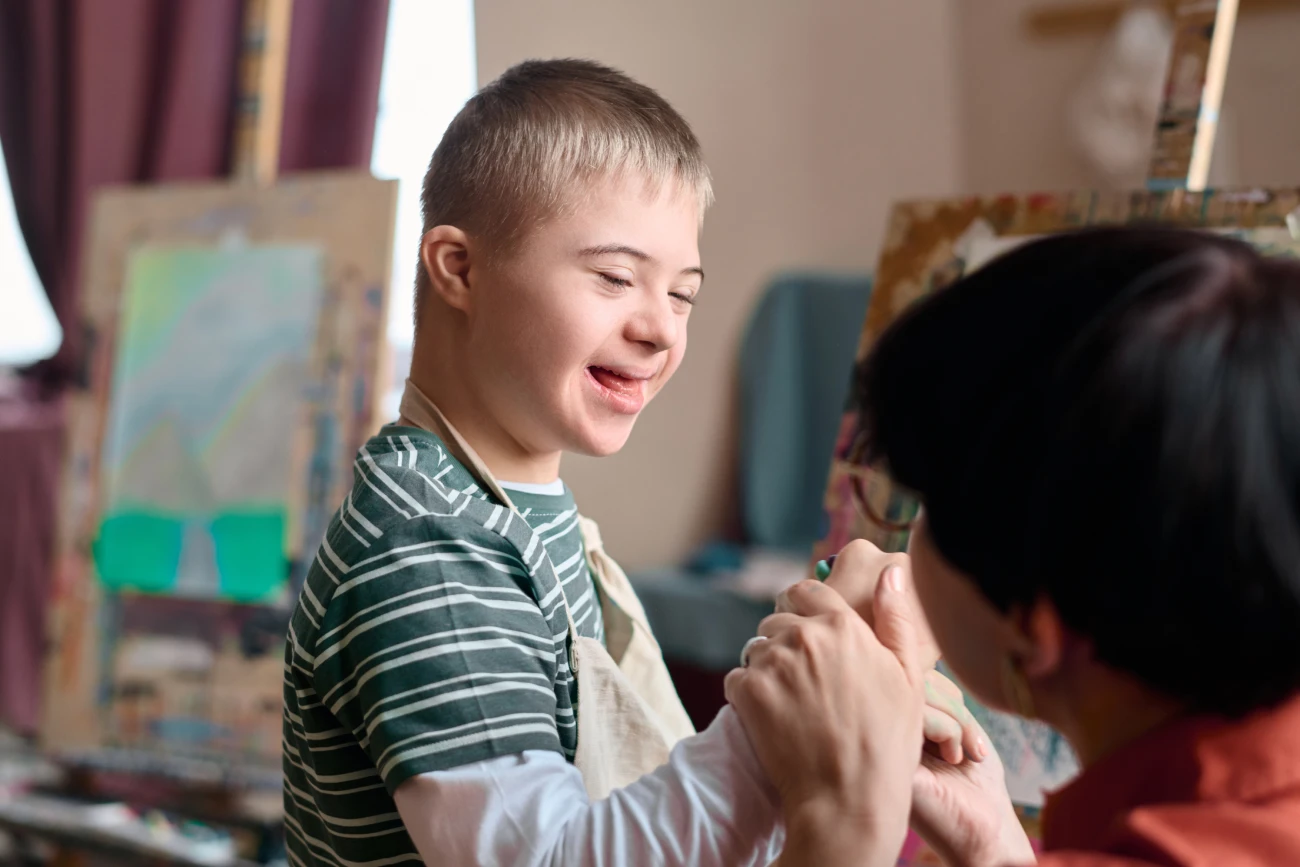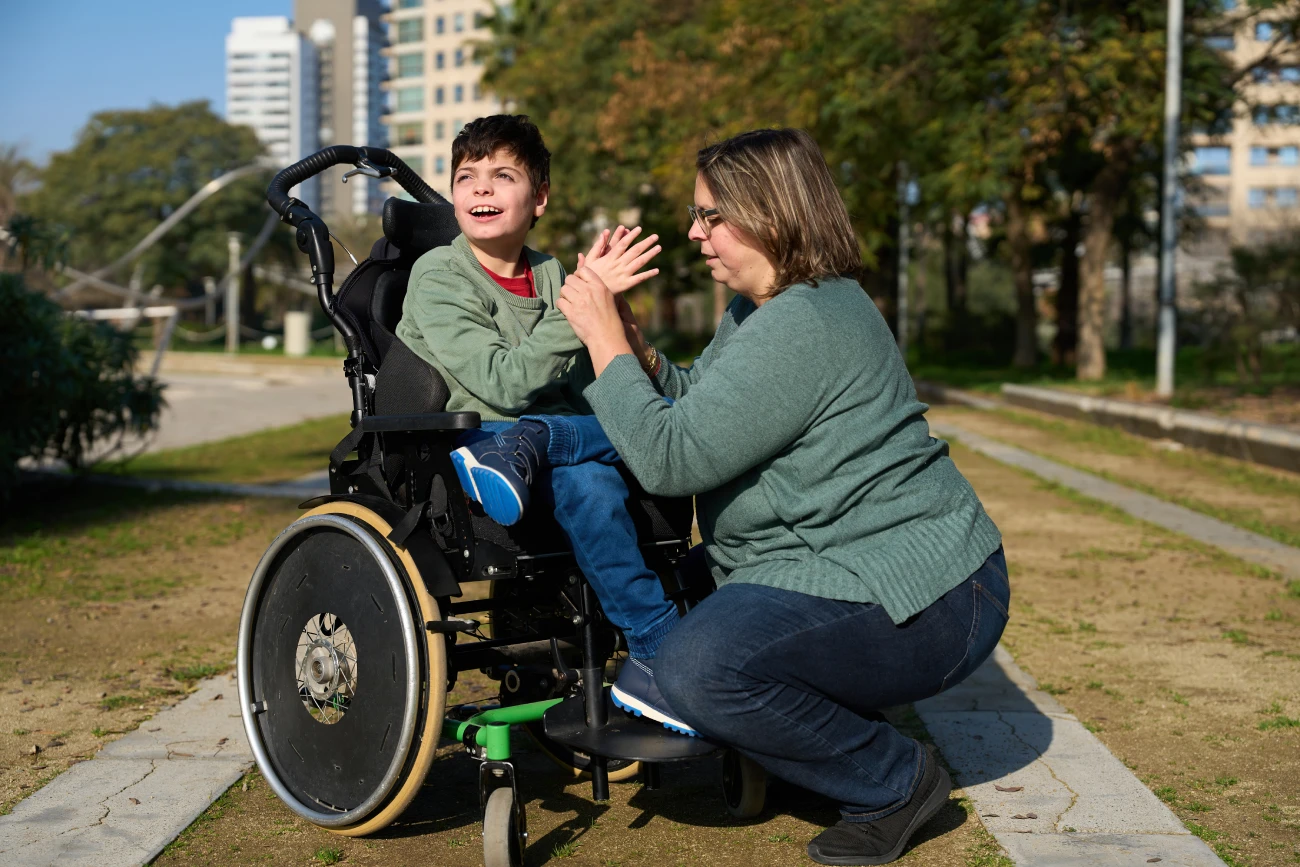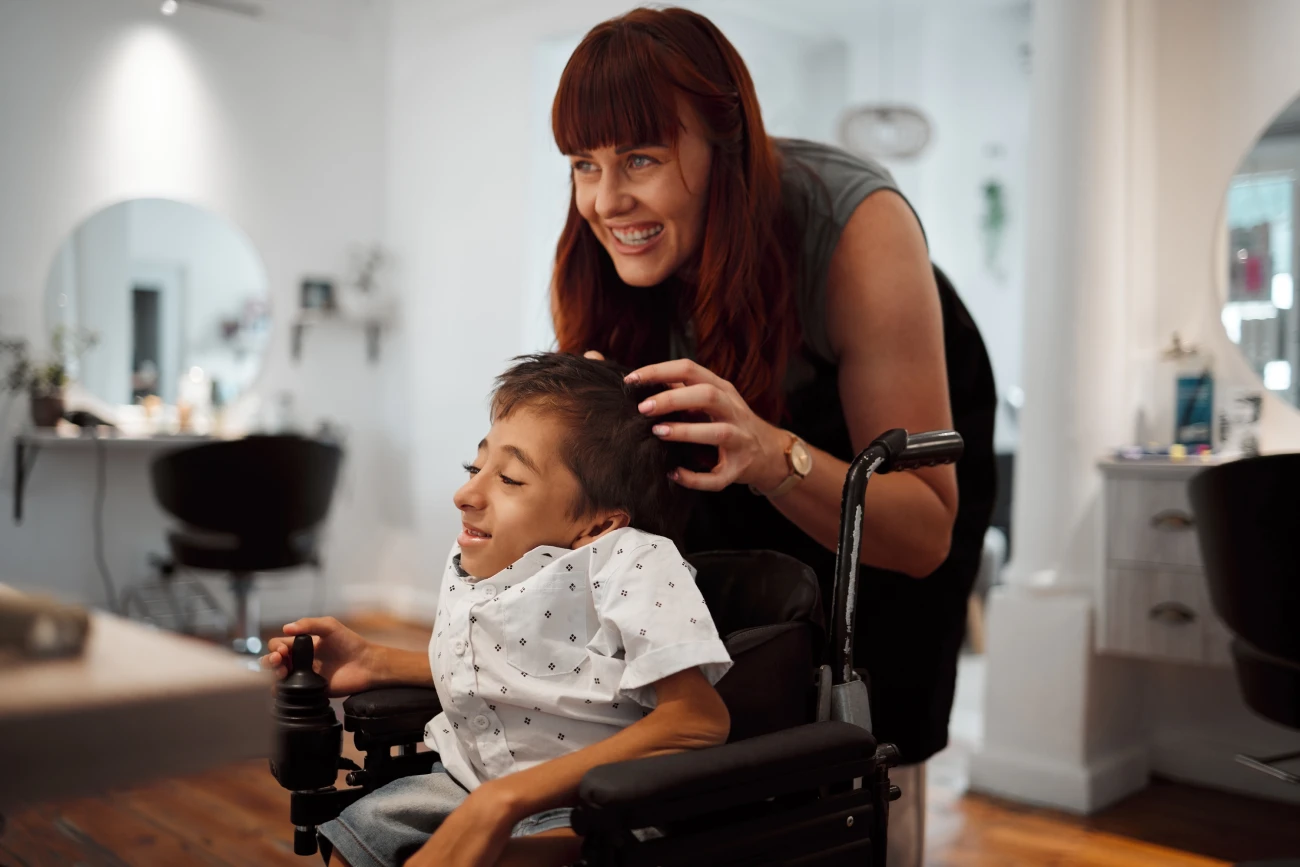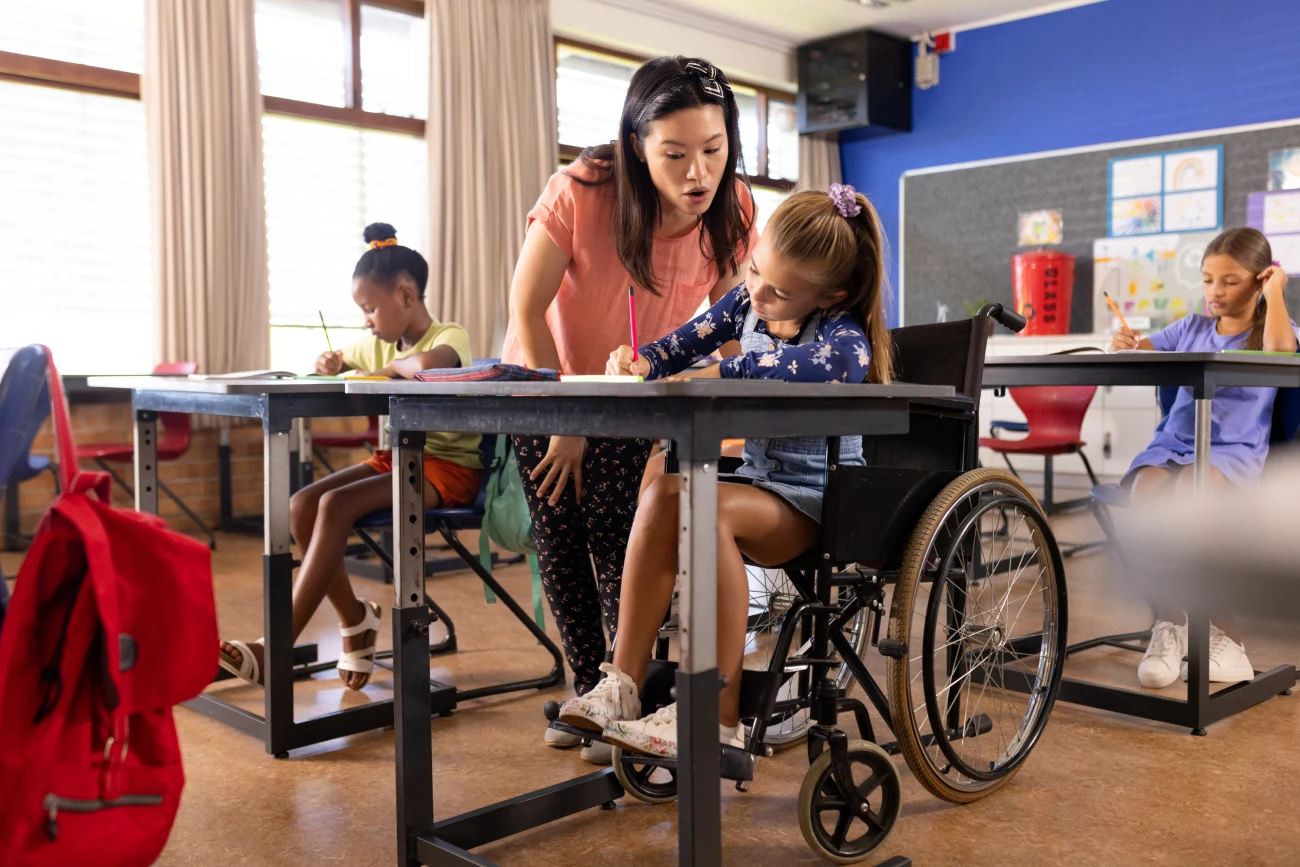Parenting a Child with a Disability:
A Guide to Support, Resources, and Advocacy
Parenting a child with a disability brings unique joys and challenges. From complex health care needs to educational accommodations to financial planning, many factors come into play when raising a child with special needs. Your mental health may also take a toll under the pressures of being a caregiver.
Resources are available to take some of the stress off your shoulders. For example, your family may qualify for financial assistance through Social Security disability benefits. Community resources such as support groups can also help you feel less alone. To find support for you and your child, explore the common challenges parents of children with disabilities face and how to navigate them.
Understanding Your Child’s Disability
No two disabled children are exactly alike. Take time to understand how your child’s disability specifically impacts them.
This knowledge allows you to tailor your support to their needs.

Educate Yourself
Disabilities are complex and nuanced. You may not have all the answers right away, so be sure to ask questions and do research.
Your child’s doctors can be one of your best resources for understanding your child’s disability. They may have glossed over details when your child was first diagnosed, so don’t be afraid to ask for clarification or further insight. If you feel you aren’t getting enough information from your health care team, consider seeking a second opinion.
Reading books and articles can also provide valuable insight into your child’s disability. Look for reputable sources from medical experts or scientific journals. Topics to explore include causes and symptoms, potential treatments, and long-term outlooks.
You may also want to connect with other parents of children with similar diagnoses. Lived experience is an invaluable resource, so consult online forums or support groups for firsthand accounts and advice.

Learn Your Child’s Strengths
Children with disabilities often struggle with self-esteem. It can be difficult for them to see other children excel at tasks that they find challenging. As a parent, you have the power to build your child’s confidence by learning their strengths and encouraging their development.
Take note of your child’s interests and talents. Maybe they love to make friends, or perhaps they’re creative or interested in problem-solving. Use these observations to guide your child toward activities they’ll enjoy.
Common Challenges Faced by Parents of Disabled Children
While parenting a child with special needs is incredibly rewarding, it’s also full of challenges that other parents may not deal with, such as the following:
- Attending frequent medical appointments
- Advocating for school accommodations or interventions
- Researching and understanding treatment options
- Managing financial strain from medical expenses
- Balancing caregiving responsibilities with work and personal obligations
- Worrying about your child’s well-being
- Feeling isolated or different from other parents
- Grieving the hopes and dreams you had for your child’s future
These stressors can take a significant toll. Mental and emotional exhaustion are common among parents of children with disabilities. You may even end up neglecting your own physical health due to the demands of caregiving. The right support and self-care practices can help you manage these challenges.
Talking to your child about disabilities can also be challenging. You may struggle to find the right words and worry about how your child will react. However, it’s important to normalize your child’s differences from an early age.
Use age-appropriate language and be honest with your child about their disability. For example, if a birth injury caused your child’s disability, explain in concrete terms what happened when they were born. You don’t have to frame it as a negative thing but simply as a part of their story.
Navigating the Health Care System
The American health care system is notoriously complicated. You must deal with insurance, medical bills, and finding the right specialists for your child. These tips can assist in managing your child’s health care needs.
Accessing Devices and Support
Health insurance often covers durable medical equipment, such as wheelchairs, crutches, and oxygen equipment. Your plan’s documents will outline what’s covered and what isn’t.
You may need prior authorization from your child’s doctor to receive coverage for necessary medical devices. They can help you determine which equipment is medically necessary and provide documentation for insurance purposes.
Your child’s doctor may also work with you to get special education accommodations. Your child may qualify for an Individualized Education Program or a 504 Plan. These plans detail accommodations and modifications for your child’s education, such as extra time on tests or a quiet study environment. Consult with your child’s health care team to determine which accommodations will best support your child’s learning.

Finding the Right Healthcare Team
Your child’s health care providers are a crucial part of your family’s support system. You want to trust them to have your child’s best interests at heart and feel comfortable communicating openly with them. Work with providers well-versed in your child’s type of disability. If you feel like your child’s current providers are not meeting these criteria, it may be time to look for new ones.
You can start by asking other parents in similar situations for recommendations. You can also consider calling your insurance company to get a list of in-network providers in your area. You can also reach out to local disability organizations for recommendations.
Managing Healthcare Costs
Health care expenses are often a major stressor for families with disabilities. You may need to meet a high deductible before your insurance will cover your child’s care. Even then, you may still be responsible for copayments and co-insurance. These costs can quickly add up if your child requires frequent medical interventions or specialized equipment.
Fortunately, there are avenues for financial assistance. Your child may qualify for state or federal programs such as Medicaid or the Children’s Health Insurance Program, known as CHIP. Some pharmaceutical companies offer patient assistance programs for families who cannot afford their child’s medication. Some nonprofit organizations also provide grants to families who need financial assistance with medical expenses.
Disability Benefits for Children
Many parents of disabled children struggle to make ends meet due to the costs associated with their child’s care. Certain government programs, including Social Security benefits, can alleviate some of this financial burden.
What Are the Two Types of Child Disability Benefits?
Yes, a disabled child may be eligible for Supplemental Security Income, or SSI. Under the Social Security Administration’s criteria, a child is disabled if both of the following are true:
- They have a medically determinable physical or mental impairment with significant functional limitations.
- Their impairment will last at least 12 months or result in death.
If your child’s medical condition meets the SSA’s disability criteria and the household income and assets fall below certain thresholds, they may be eligible for monthly SSI payments.
Other Financial Aid Options for Parents with Disabled Children
Your family may also receive the following financial aid, depending on income and other factors:
- Supplemental Nutrition Assistance Program, or SNAP benefits, which provide money for food
- Temporary Assistance for Needy Families, or TANF, which provides cash assistance to low-income families with children
- Medicaid, which provides health care coverage to low-income disabled people
- Children’s Health Insurance Program, or CHIP coverage, which provides health care coverage to children whose families don’t qualify for Medicaid but can’t afford private insurance
- Achieving a Better Life Experience Act, or ABLE, savings accounts, which allow people with disabilities to save money and withdraw it tax-free for disability-related expenses
- Special needs trusts, which allow family members to set aside money for their disabled child’s future needs without affecting their eligibility for government benefits
Navigating Specific Disabilities
Different mental and physical conditions require unique considerations and support. Parents can benefit from insights into caring for children with common categories of disabilities.
Parenting a Child with a Learning Disability
Common learning disabilities include the following:
- Dyslexia
- Dyscalculia
- Dysgraphia
- Auditory processing disorder
- Visual processing disorder
- Nonverbal learning disabilities
These disabilities affect how a child processes and uses information. They often involve difficulties with reading, writing, math, reasoning, or communication.
Children with learning disabilities often have average or above-average intelligence. They simply need the right support to unlock their potential. School accommodations can go a long way in helping these children succeed. Occupational therapy and specialized tutoring can also be beneficial. If their learning disability significantly impacts their daily functioning, your child may be eligible for certain benefits, such as SSI.


Parenting a Child with an Intellectual Disability
Intellectual disabilities involve significant limitations in intellectual functioning and adaptive behavior. These limitations can affect a child’s independence and daily life skills. Examples of conditions that may cause intellectual disabilities include the following:
- Down syndrome
- Fragile X syndrome
- Prader-Willi syndrome
- Angelman syndrome
- Rett syndrome
- Fetal alcohol spectrum disorders
- Tuberous sclerosis
- Hypothyroidism
- Lead poisoning
- Environmental factors, such as malnutrition
Encourage life skills development to build independence over time, starting as early as possible. Financial assistance programs such as SSI can help your family pay for vocational training or assisted living as your child ages. Utilize these resources to help your child lead a fulfilling life.
Parenting a Child with a Learning Disability
Common learning disabilities include the following:
- Dyslexia
- Dyscalculia
- Dysgraphia
- Auditory processing disorder
- Visual processing disorder
- Nonverbal learning disabilities
These disabilities affect how a child processes and uses information. They often involve difficulties with reading, writing, math, reasoning, or communication.
Children with learning disabilities often have average or above-average intelligence. They simply need the right support to unlock their potential. School accommodations can go a long way in helping these children succeed. Occupational therapy and specialized tutoring can also be beneficial. If their learning disability significantly impacts their daily functioning, your child may be eligible for certain benefits, such as SSI.

Finding Resources and Support
It’s common to feel alone after learning your child has a disability. Remember that other parents have been there and are willing to offer support. Connecting with others who understand your situation can be a lifeline, so be sure to find a community of support. Try these options:
- Seek out online forums or Facebook groups dedicated to your child’s condition.
- Connect with your state’s Parent Training and Information Center, or PTIC. These federally funded programs offer support groups, parent training, and pairings with parents in similar situations.
- Take advantage of the Special Education Parent Advisory Council, or SEPAC, at your child’s school. All school districts in the U.S. must have a SEPAC, which can serve as a support network.
- Community-focused local groups can also be a great resource. Sports leagues, art classes, summer camps, and other community programs often have special opportunities for children with disabilities.
Choosing the Right School or Program
Education can make all the difference in your child’s life. Many larger public school districts have special schools dedicated to children with disabilities. If this isn’t an option, explore your local school system’s special education programs. These programs may have separate classes for disabled students if their disability warrants it. In other cases, disabled students learn alongside non-disabled students with accommodations such as extra time on tests or modified assignments.
If public school isn’t the right fit for your child, private schools and specialized programs are also available. When deciding on a school or program, make sure to consider the following factors:
- Class size and student-to-teacher ratio: Smaller class sizes and lower student-to-teacher ratios allow for more individualized attention and support for your child.
- Specialized services and accommodations: Look for a school that specifically addresses your child’s needs. Some schools specialize in certain disabilities, such as dyslexia or autism.
- Qualified staff: Look into the qualifications of the teachers and staff at the school or program. Consider meeting with them and asking about their experience working with children with disabilities. Ask how they’d handle certain situations and make sure their approach aligns with your goals for your child.

Finding the Right Healthcare Team
Your child’s health care providers are a crucial part of your family’s support system. You want to trust them to have your child’s best interests at heart and feel comfortable communicating openly with them. Work with providers well-versed in your child’s type of disability. If you feel like your child’s current providers are not meeting these criteria, it may be time to look for new ones.
You can start by asking other parents in similar situations for recommendations. You can also consider calling your insurance company to get a list of in-network providers in your area. You can also reach out to local disability organizations for recommendations.
Tips To Avoid Burn Out
Burnout is a common impact on parents who have a child with a disability. You want to put your child first but you should always try to prioritize your own well-being, too.
It’s okay to admit you can’t do everything. Consider using respite care services if you need a break from caretaking. If respite care isn’t an option, ask friends or family members to step in if you feel overwhelmed. You may be surprised at how willing people are to help out when they know you need it.
Therapy can also be beneficial. Work with a therapist who specializes in providing support for parents with disabled children. They can help you find effective coping strategies and provide a safe space for you to process your feelings.
Finally, make time for self-care. Even a few minutes daily can make a big difference in your mental health. Some ideas for quick self-care activities include meditating, going on a short walk, taking a warm bath, or simply taking a few deep breaths.
